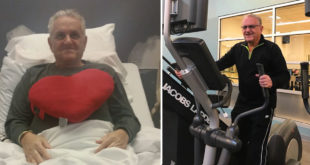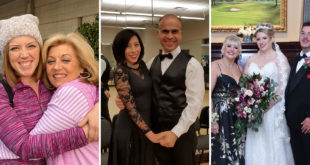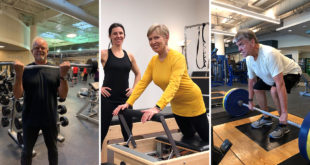by Michelle Sutton-Kerchner
A fitness commitment at any age can be a challenge. Middle age has its own obstacles to achieving fitness goals. Remain steadfast at this life-stage. Here is how to manage it …
There is not an official year-span to define “middle age.” Some consider it the middle of the average lifespan, starting around the fourth decade. Others stretch the definition to include those up to age 60 years. Perhaps the definition changes based on how we feel during any given day, and what we predict our lifespan to be.
Some key elements of middle agedness can be assumed. It is often the time when those random gray hairs are noticed, maybe in the mirror of a child’s college dorm room. Your flushed reflection catches you unawares, confirming you no longer can bolt up five flights of stairs with suitcases and furnishings in hand. Such are the stereotypical occurrences of middle age: transforming appearance, reduced cardio capacity, and increased waistline.
The human body changes through each phase of life. The quality with which one ages is considered 30 percent genetic. The remaining 70 percent is based on individual choices.
The Right Choices
Regular exercise during middle age can help prevent chronic health conditions for years to come. It also helps those years-to-come exist in the first place. One study of 18,000 individuals with an average age of 49 years confirmed fitness level was directly related to the chance of developing serious health issues over a 26-year follow-up.
Women often experience menopause during middle age, which increases the occurrence of osteoporosis. Approaching this change with a fitness routine allows healthier bones than their sedentary counterparts. A study published in the Journal of Clinical Endocrinology and Metabolism reported as little as two hours of exercise per week was helpful in osteoporosis prevention.
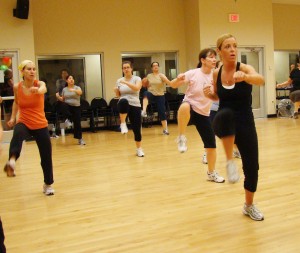
During middle age, one frequently shares the conundrum of the sandwich generation. There is a struggle to simultaneously provide care to both parents and children. Compiled with demanding careers in a risky economy and a fast-paced social world, middle agers barely have time for a full night’s sleep, let alone time or energy to exercise. We all know the facts of a busy life. This intense lifestyle is what makes remaining healthy essential. And exercise will get you there.
Fat Facts
Starting around age 40, muscle strength decreases each year. This age-related loss of muscle mass and strength is called sarcopenia. Just do nothing and it happens!
- Age 40: Muscle mass decreases annually by up to one percent. Although one percent is not much, consider 10 quick years from now.
- Age 60: Muscle mass decreases annually by up to 1.5 percent each year.
- Age 70: Muscle mass decreases annually by up to 3 percent each year.
Some are of the mindset that at 70 years old, there is no longer a need to look svelte. You are comfortable, happy, and enjoy nightly ice cream with minimal medications. Muscle is not all about appearance. A fit physique improves overall health, enhances quality-of-life, and, yes, helps you look better while living a longer lifespan. Perk: It never hurts to remain the twinkle of your spouse’s eye, even if you have been married for 25 years.
Muscle counteracts nature’s work in the 40+ body. It helps burn fat to reduce weight gain common in later years. It assists the body in remaining balanced to avoid falls. Once youth is a memory, so are the simple Band Aids with which injuries are treated. Healing takes longer as the body’s metabolism and ability to regenerate slows. Some falls have serious consequences. Fifty percent of those who suffer broken hips never return to their pre-fall function.
Be Workout Ready
Schedule your backlog of well check-ups. Review pre-existing conditions and discuss any precautions needed in your fitness plan.
Pace yourself– whether beginning an exercise regimen for the first time, reintroducing your former athletic self to exercise, or advancing fitness to Ironman status. For many middle-agers, this is the first formal exercise routine since college years, when sleep deprivation was actually a choice. At this stage, any kids in the house should be letting you sleep through the night. It’s time to get back in action with a slice of self-care.
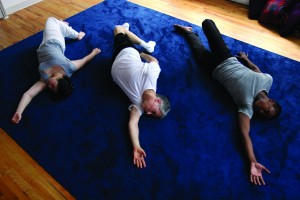
Don’t neglect stretches. You may have hit the ground running in your 20s, but you are now in your “older younger years.” Besides, neglected warm-ups of your youth may be the cause of that prematurely arthritic knee or tricky elbow.
Focus on stretching your hips throughout the day. The hips play a key role in maintaining balance and back health. Stretch hip flexors with exercises like the bridge and hip hinge. (See “When Chores Hurt,” https://fitnessandwellnessnews.com/when-chores-hurt/ for video demonstration.) Extended sitting at your desk, behind the wheel, or on the floor during family play is the culprit of routinely tightened hip muscles. Middle agers spend a lot of time in these hip-tight positions. By actively stretching hip flexors, you are better able to keep hips aligned and aches away.
Ditch old sneakers used for daily activities like shopping and errands. Invest in exercise-worthy sneakers and workout clothes that help you feel comfortable and confident. Good sneakers help you perform on the Exercise Floor. A new pair of running shorts and shirt may help overall fitness commitment, especially if your previous workouts were done 80s style in legwarmers and sweat bands.
Make Fun a Goal
Choose activities you enjoy. Then, base your goals on what these exercises can realistically accomplish. Beginning a new stage of life is an excellent opportunity for meeting with a personal trainer and learning about your fitness options. As you navigate The Middle, a personal trainer can offer advice relevant to your specific age. Small Group Training allows personalized attention in a comfortable group setting. Grab some friends and set common goals. It is likely they all want to get through the days with a little more energy.
A few training sessions or an ongoing chat with a Group Fitness instructor helps carve your latest path in the journey to better health. You may have spent the last couple decades focused on building your life. Now, it is time to strengthen the builder.
Strength training is especially important at this life stage. Today’s middle-agers often grew up associating weight training with specific sports and serious jocks. It was not used as a prominent form of exercise on its own as it is today. Remember the benefits of toned muscles versus that age-related metabolism decline! Tip: Multitask weightlifting. Stand and do those reps. This builds muscle while simultaneously strengthening bones.
Experts suggest strength training the major muscles, performing eight to 10 repetitions three days per week. Weight training sessions should increase incrementally to last about 30 minutes each. The hormonal decreases that begin at this age also affect heart health so don’t neglect a cardio routine. And, remember those stretches!
Wondering what to do with those weights? Tone the arms with some bicep curls and tricep kickbacks. Strengthen quadriceps to avert knee problems and mobility issues common to later years (which are coming sooner now). Clueless? Ask a trainer to demonstrate these and more. S/he can also suggest proper weight amounts and equipment.

During the middle years, it may take more effort to maintain a healthy weight. The same weight may have come naturally in your 20s and 30s, despite late-night pizza and ice cream. Sweets tend to get a little “stickier” with age. But, the effort for a healthy, fit life definitely enhances the ability to smile. And you look so cute with your newly arrived crow’s feet.
Sources
“How to Start a Fitness Plan Over 40,” by Beth W. Orenstein at www.everydayhealth.com.
“Over 40, Fit, and Ready to Bare Arms,” by Kathleen Doheny at www.webmd.com.
Image Credits
Tree of life: http://www.flickr.com/photos/h-k-d/3434240846/
Stretch: Photo by Rosalie O’Connor. Feldenkrais Guild.
Crow’s feet: http://www.flickr.com/photos/onefromrome/219709038/
 Fitness & Wellness News Your Source for Fitness News, Wellness News, Health News, and Nutrition News!
Fitness & Wellness News Your Source for Fitness News, Wellness News, Health News, and Nutrition News!





